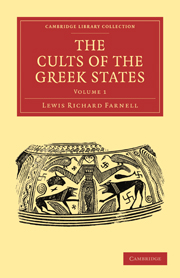Book contents
- Frontmatter
- PREFACE
- Contents
- LIST OF PLATES IN VOL. I
- INTRODUCTION
- CHAPTER I THE ANICONIC AGE
- CHAPTER II THE ICONIC AGE
- CHAPTER III CRONOS
- CHAPTER IV ZEUS
- CHAPTER V THE CULT-MONUMENTS OF ZEUS
- CHAPTER VI
- CHAPTER VII HERA
- CHAPTER VIII THE CULT-MONUMENTS OF HERA
- CHAPTER IX IDEAL TYPES OF HERA
- CHAPTER X ATHENA
- CHAPTER XI MONUMENTS OF ATHENA-WORSHIP
- CHAPTER XII IDEAL TYPES OF ATHENA
- GEOGRAPHICAL REGISTER OF ATHENA CULTS
- Plate section
CHAPTER I - THE ANICONIC AGE
Published online by Cambridge University Press: 05 October 2010
- Frontmatter
- PREFACE
- Contents
- LIST OF PLATES IN VOL. I
- INTRODUCTION
- CHAPTER I THE ANICONIC AGE
- CHAPTER II THE ICONIC AGE
- CHAPTER III CRONOS
- CHAPTER IV ZEUS
- CHAPTER V THE CULT-MONUMENTS OF ZEUS
- CHAPTER VI
- CHAPTER VII HERA
- CHAPTER VIII THE CULT-MONUMENTS OF HERA
- CHAPTER IX IDEAL TYPES OF HERA
- CHAPTER X ATHENA
- CHAPTER XI MONUMENTS OF ATHENA-WORSHIP
- CHAPTER XII IDEAL TYPES OF ATHENA
- GEOGRAPHICAL REGISTER OF ATHENA CULTS
- Plate section
Summary
The Homeric poems, as has been said, present us with a group of divinities not at all regarded as personifications of the various forces and spheres of nature, but as real personages humanly conceived with distinct form and independent action. We have no clear trace in the literature legend and cults of Greece of that earlier stage which is often supposed to precede polytheism in the cycle of religious development, a stage of polydaemonism when the objects of worship are vague companies of ‘ numina ’ nameless and formless. There is no evidence of this, as regards Greek religion, in the statement of Herodotus that the Pelasgians attached no names to their divinities, for Herodotus is in the first place defending an unscientific thesis that most of the Greek divinities derived their names from Egypt, and may be only referring to the primitive custom of avoiding the name of the divinity in ritual. Nor are Hesiod's lines, that speak of the thirty thousand daemones of Zeus, the ‘ watchers of mortal men,’ any proof that Greek religion had passed through that earlier stage; for Hesiod is often perfectly free in the creation of such unseen moral agencies, or if there is some popular belief underlying this conception, it is that which was attached to hero-worship; but however old this may be it cannot be proved to be prior in the history of Greek religion to the higher cult.
- Type
- Chapter
- Information
- The Cults of the Greek States , pp. 13 - 18Publisher: Cambridge University PressPrint publication year: 2010First published in: 1896



